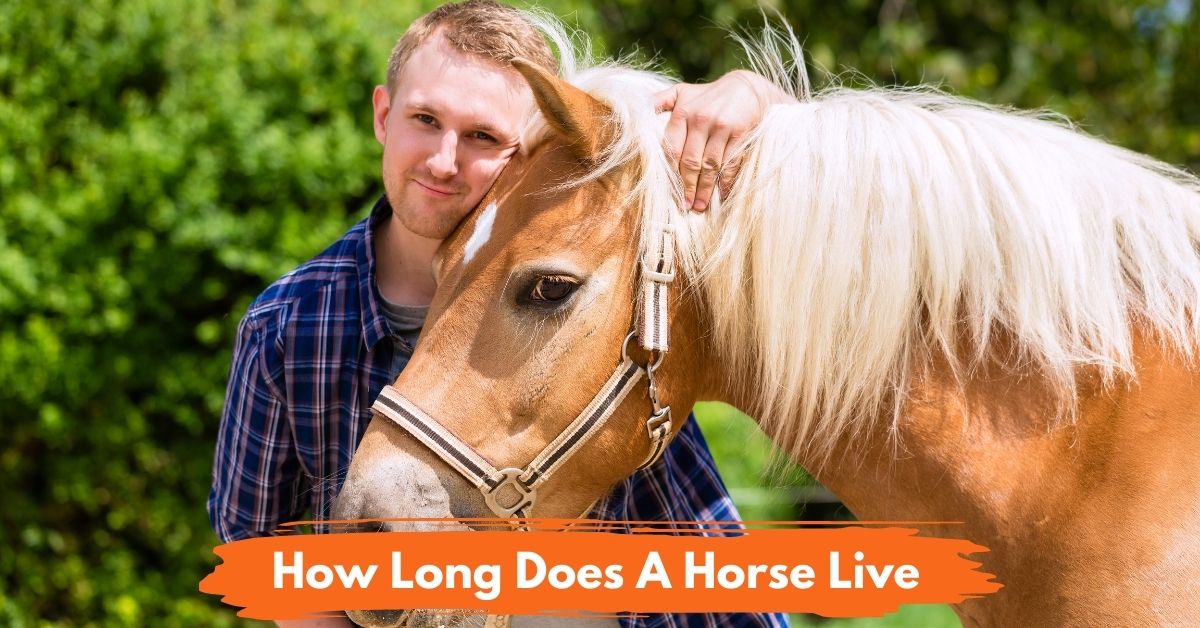
A horse can live up to 20 to 30 years. A study shows that small breeds of horses, like a miniature horse, can outlive the larger ones.
The discovery is that dwarfism protects against cancer and diabetes. This result is interesting, but the lifespan of a horse depends on a lot of factors.
Disease, dental health, nutrition, and physical activity affect the horse’s well-being.
You’ll find discussions about these factors here. As a horse owner, you have to know and understand them. These factors can help you to be more observant when looking after your horses.
How Old Can Horses Live?
The typical lifespan of horses is 20 to 30 years. According to records, some horses in captivity can live up to 61 years.
Small breeds like ponies can live longer. You may even make them schoolmasters even when they’re in their 30s. So, how long does a mini horse live? It can live up to 30 to 40 years.
Unfortunately, large breeds like draft horses can live only around 18 years. Thus, the life span is distinct among breeds. Here’s a chart for comparison.
| Breed | Lifespan |
|---|---|
| Arabian Horse | 25 to 30 years |
| Appaloosa Horse | 25 to 35 years |
| Haflinger Horse | 25 to 30 years |
| American Paint Horse | 25 to 30 years |
| Mustang | 15 to 20 years |
| Friesian Horse | 14 to 16 years |
| Clydesdale Horse | 25 to 30 years |
| Draft Horse | 15 to 20 years |
| Domestic Horse | 25 to 30 years |
| Shire Horse | 25 to 30 years |
| Halovarian Horse | 25 to 30 years |
| Gypsy Vanner | 20 to 25 years |
| Tennessee Walker | 28 to 33 years |
| Standardbred Horse | 30 to 35 years |
| Thoroughbred Horse | 25 to 28 years |
| Quarter Horse | 25 to 35 years |
| Akhal Teke | 18 to 20 years |
| Irish Sport Horse | 28 to 33 years |
| Norwegian Fjord | 28 to 30 years |
| Belgian Horse | 17 to 22 years |
| Percheron Horse | 25 to 30 years |
| Icelandic Horse | 25 to 30 years |
| Paso Fino | 25 to 35 years |
| Dutch Warmblood | 25 to 30 years |
| American Saddlebred | 25 to 30 years |
| Shetland Pony | 20 to 25 years |
| Miniature Horse | 28 to 35 years |
| Andalusian Horse | 20 to 25 years |
| Morgan Horse | 20 to 30 years |
How Long Do Race Horses Live?
In the 25 to 30 years lifespan of racehorses, most of them spend 2 to 10 years in their racing career. The average lifespan is 27 years which is also the typical lifespan of other breeds. So, it’s surprising as they have a higher chance of injury.
How Long Do Wild Horses Live?
Wild horses, like mustangs, have an average lifespan of 15 years, but some may live up to 36 years.
How Long Do Kentucky Derby Horses Live?
Kentucky Derby Horses are racehorses. Thus, they have an average lifespan of 27 years. It’s the common life expectancy for most horses.
What is the Oldest Horse in the World?
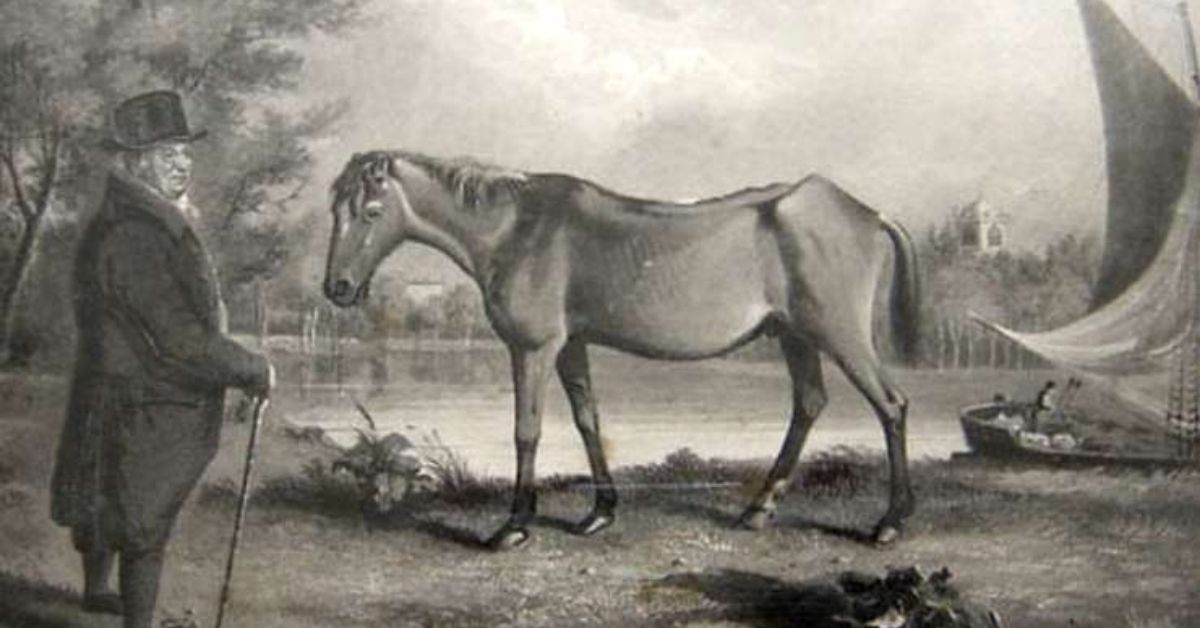
According to the Guinness Book of Records, the oldest horse in the world is Old Billy. It was a barge horse and continued to serve until his old age. In the 18th century, this horse towed barges in the UK. He died at the age of 62 years.
Old Billy has the appearance of a shire or cob horse. His body was brown with some white blaze.
Symptoms of Aging in Horses
Older horses are prone to developing horse health problems as the years pass, just like older people. Here are four signs of aging you should watch for with the help of your veterinarian.
Weight Loss
Many horses, as they grow old, will drop a few pounds for a variety of reasons.
You can blame weight loss on worn-out teeth that hinder proper chewing. When a horse becomes inactive, it loses a noticeable amount of muscle mass.
In winter, the metabolism ramps up to deliver warmth to an equine’s body. Hence, the weight loss is due to the higher calorie needs.
Illnesses also cause weight loss in horses. It’s a valid reason if you’ve confirmed your horse’s health condition with an expert.
Weakened Immune System
T-cells are white blood cells that fight diseases among equines. They decline in number when a horse ages.
Thus, a horse becomes more susceptible to diseases, and its recovery becomes slower. A weakened immune system also means it can’t get the full protection of a vaccine.
The horse is at high risk of internal parasite infestations without proper protection.
Loss of Fitness
Horses find it hard to tolerate stress as they get older. Hence, you’ll notice that they don’t want to walk or move often. They don’t fare well in the cold season and under high temperatures. Also, there are changes in hormone production and pecking order.
Dental Troubles
Tooth decay is inevitable among old horses. Veterinarians can remove infected teeth or put them into an even setting.
Teeth are essential so a horse can chew food. Once it has a dental issue, it fails to have enough food intake.
If a horse doesn’t chew its food before swallowing, you’ll see whole grains and food particles in its dung. When this happens, the animal can’t get nutrients from the feed and roughage.
Prone to Diseases
As your horses get older, they face common diseases that require care. Here are the diseases that elderly horses can experience.
Chronic Pain
Senility is not common among horses. But it doesn’t mean they don’t have unpleasant experiences as they get older. Some horses suffer from chronic pain. Because of this pain, they exhibit signs that you may misinterpret as mental decline.
Cushing Disease and laminitis
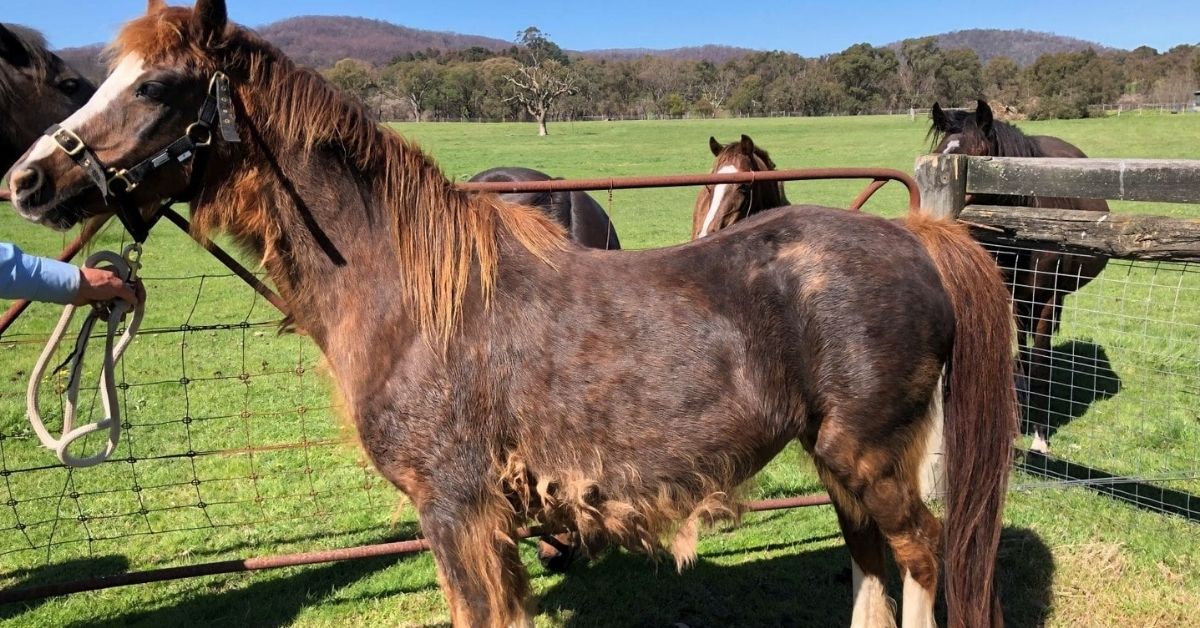
Elderly horses may develop laminitis which is a crippling disease. It is common among the horse breeds and crosses that are native to the UK. After laminitis, Cushing’s disease afflicts the horse. It’s a disease that alters and deteriorates mental capability.
Arthritis
It’s normal for elderly horses to have arthritis. There’s no way to end this condition as it’s part of aging. But you can prevent it from getting worse by letting your horses engage in exercises.
Skin Tumors
Melanoma and sarcoid are skin tumors that older horses can have. Melanoma will likely develop on old, gray horses. It’s a tumor and less aggressive than a sarcoid. If you have gray horses, you have to inspect their bodies for skin nodules.
Sarcoids grow and infect fast. Both sarcoid and melanoma show up on sensitive parts of the body. So, you’ll find them on a horse’s belly, dock, eyelids, inner thigh, sheath, and udder.
Horse Years to Human Years
A year of horse life is 6.5 human years. Here’s a comparison chart with the average horse age. Growth and maturity vary among horse breeds. But most horses reach physical maturity at the age of 5 years.
| Horse Age | Human Equivalent | Life Stage |
|---|---|---|
| 1 Year | 6.5 Years | Baby |
| 2 Years | 13 Years | Puberty |
| 3 Years | 18 Years | Teenager |
| 4 Years | 21 Years | Young Adult |
| 5 Years | 25 Years | Adult |
| 10 Years | 36 Years | Thirty-something |
| 13 Years | 44 Years | Middle Aged |
| 20 Years | 60 Years | Senior |
| 25 Years | 70 Years | Average Lifespan |
| 30 Years | 86 Years | Extremely Old |
| 36 Years | 100 Years | Centurion |
How to Help Your Horse Live Longer
There are several signs of aging through physical and mental aspects. You can’t stop them as they are part of aging, but you can do something to make your horse age well and live longer.
Care For Your Horse’s Teeth
Adult horses should have a dental checkup once a year. But 2 to 5-year-old horses need more than one checkup in a year. It’s essential as a lot of dental maturation occurs in this equine’s life phase.
Floating is the process of removing any sharp teeth. It’s often done before training. A dental checkup ensures that your horse has proper teeth alignment. Also, it’s a chance to diagnose dental issues.
Old horses aged 17 years and up have a high chance of periodontal disease. It’s best to make the diagnosis early. So, you can apply proper treatment and save your horse from this painful disease.
There are ways to boost the teeth health of horses 20 years of age and over. Dental evaluation and nutritional counseling are essential methods. These processes promote the equine’s life quality and condition.
It’s inevitable that body parts like teeth deteriorate. But with routine dental care, it’s possible for horses in their 30s or 40s to have a functional dentition.
Care For Your Horse’s Hooves
Hoof management has effects on a horse’s health. If it’s not ideal, it can lead to lameness. Hence, hoof care is a part of daily grooming. You must remove dirt, stones, and manure from the hooves daily.
Also, you have to check for bruising, discoloration, discharge, and odor. Be particular with the condition of your horse’s shoes and the nail’s tightness.
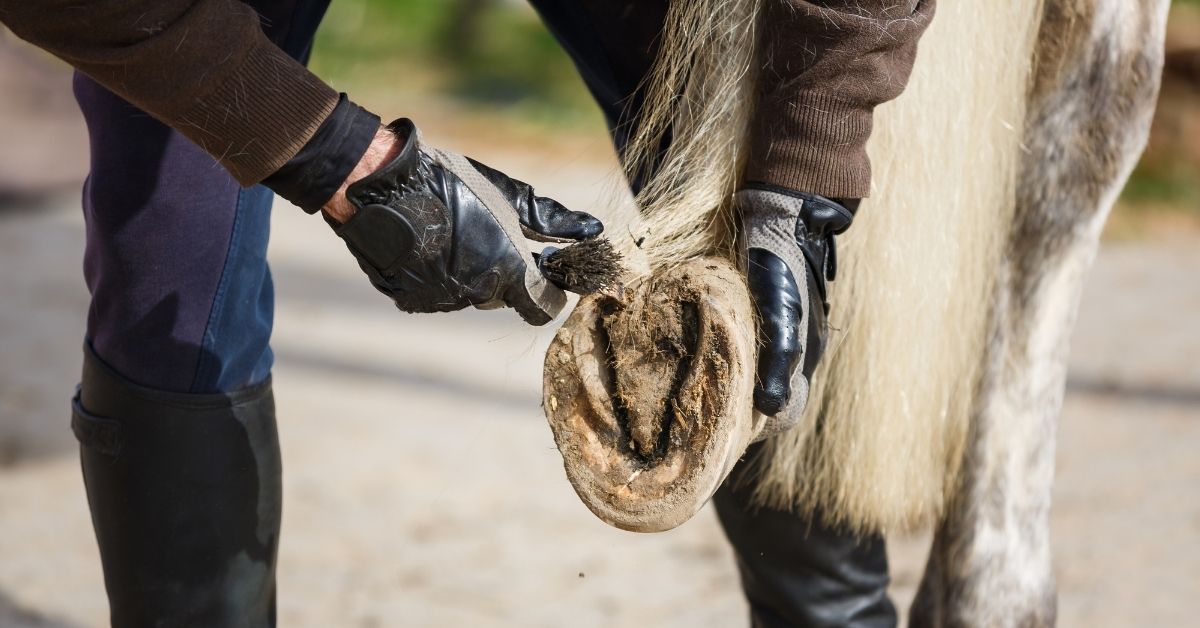
You’ll need to use horse dressings in some cases. Water-repellent dressings can keep hooves dry and healthy when the weather is wet. But use only a little emollient dressing as it can make the hooves soft.
Use an antifungal solution to prevent thrust during wet weather and winter days. You can apply it to the hooves every week or two weeks. Ask advice from a veterinarian or farrier about dressings and solutions for hooves.
Trimming of hoovers every six weeks is essential. To make this process successful, you must train your horse to stand with proper posture, and you can entrust the trimming to the vet or farrier.
Feed Your Horse Often, Not Too Much at a Time
Horses are grazers in nature. So, they need to have frequent, small meals. Equines would love to forage on pastures where there is grass and hay.
Giving treats like corn, oat, apples, and oranges is fine as long as they’re in minimal amounts. A horse can have one to two pounds of treats per serving. But you have to put pregnant and nursing horses on a strict diet.
Stick with feeding your horse three times a day to encourage grazing. You can serve small meals throughout the day if you have slow-feeder horses.
Water is also important in a horse’s diet. So, see to it that your horses drink enough water daily. An average-sized horse should drink 8 gallons of water a day.
Keep Your Horse’s Vaccinations Current
Illnesses can shorten the lives of horses. That’s why a once-a-year medical checkup is a must. Thus, you have to keep the horse’s vaccinations current.
As a responsible horse owner, you must ensure that your horse gets vaccinated. It protects against equine anemia, botulism, influenza, and encephalitis.
There are vaccines against rabies, rotavirus, herpes virus, and tetanus. It’s the same with rabies, Potomac horse fever, and streptococcus equi-infection. But there’s no available vaccine for abscesses, arthritis, colic, laminitis, and thrush.
Keep the Horse Housing Clean
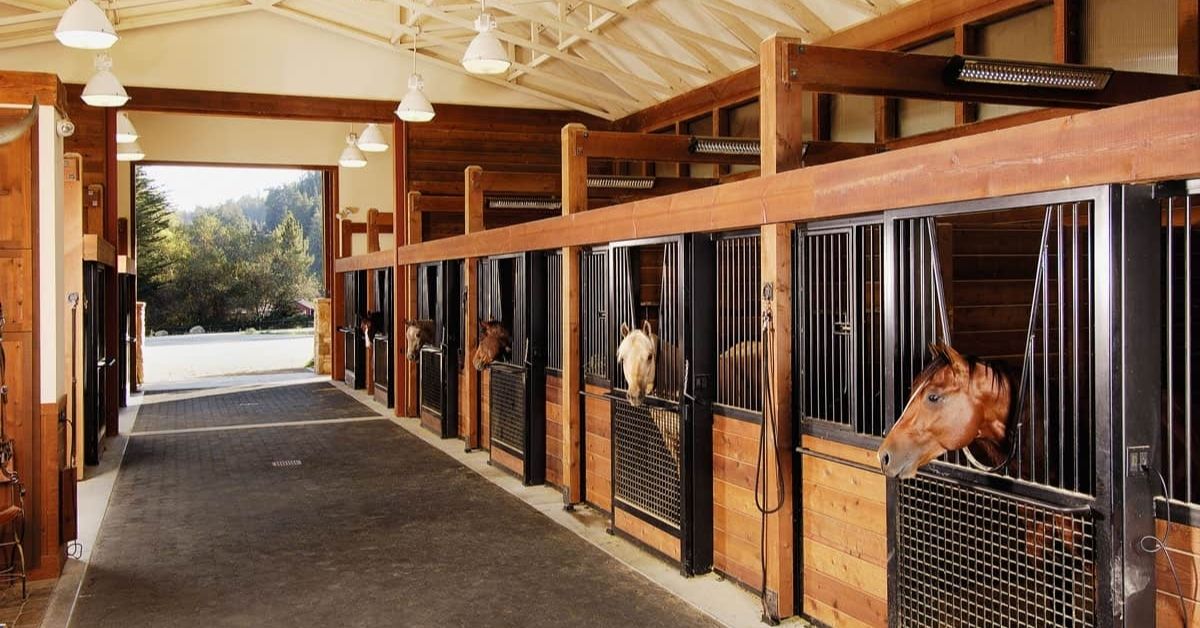
Aside from the protection a shelter offers, you must be aware of its cleanliness. You need to keep it clean and remove manure every day.
Make sure that your horses have access to dry, comfortable, and safe shelter. So, they have protection against snow, rain, wind, and harsh weather conditions.
When summertime comes, provide shade where horses can rest. During this period, you have to shield your horses from insect bites. A three-sided, well-constructed shed can accommodate your horses.
During cold weather, you need to provide a blanket for your horses. You may use a fan to cool down the horses on hot days.
Assess Your Horses Workload
Every horse breed has a particular purpose and use. Those that have risky and rigorous duties have a shorter lifespan.
In the case of racehorses, they join competitions for 2 to 10 years. Races can be dangerous, and some horses get injuries. The worst scenario is that horses can’t recover.
Some horse owners stop caring about the well-being of a racehorse once it’s retired. But horses can live for three decades if they live in ideal conditions.
Regularly Exercise Your Horse
Per the veterinarian’s advice, every horse shouldn’t stay in its stall all day. Riding it is a simple way of exercise. You have to set up a pasture or paddock so the horse can have a relaxing stroll.
Spend Time With Other Horses
Like humans, horses need to be with their peers. Yes, they need to socialize too. You may let your horses graze with your other horses to establish a friendship.
Spend Time With People
You may not have any idea, but spending time with your horse can prolong the lifespan of your horse. Although they can’t respond to you through speech, you can talk to them. You can bond with them during grooming and petting.
Conclusion
Signs of aging and a decline in health are inevitable. But you can do things to keep them healthy. So, some horses surpass the expected lifespan of 20 to 30 years.
You have to follow the proper pattern of feeding your horse. Give your equines a clean and comfortable shelter for different kinds of weather. It’s necessary to take care of the horses’ teeth and hooves.
A veterinary visit every year is a must. It’s also to make sure that vaccinations are up-to-date. Spend time with your horse, as it’s also crucial to the animal’s well-being. It also needs to hang out with its fellow equines, like grazing in a pasture.
